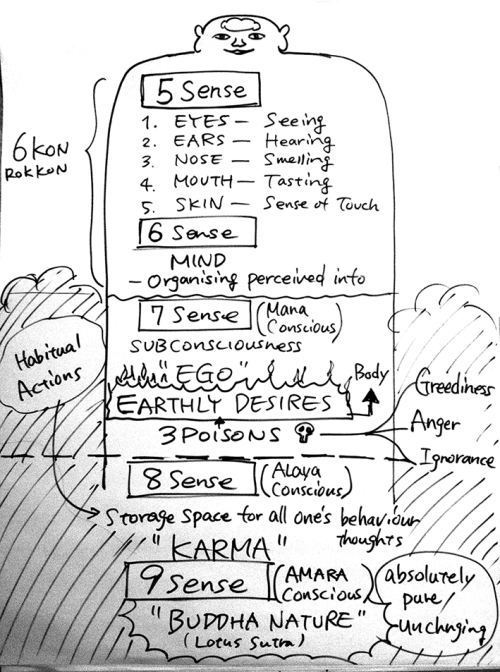
As independent human beings, we often prefer to rely on our instincts and wisdom, taking action based on our own initiative. We trust ourselves, accept the consequences of our choices, and learn from our mistakes, striving to improve each time. This self-reliance is a natural and positive approach, shaped by the experiences we gather throughout life.
However, from the perspective of True Buddhism, human perception is limited and shaped by a narrow, self-centered outlook. While Buddha and ordinary people are both human, the key difference lies in Buddha’s ability to perceive the true nature of the universe. Through enlightenment, Buddha uncovered the mechanisms of life, the causes of suffering, and the path to liberation.
Buddhism teaches that within us lies a hidden consciousness that goes beyond even the subconscious. According to Buddhist teachings, there are nine levels of consciousness:
1-5, The Five Senses : Sight, hearing, smell, taste, and touch—gathering information from the external world.
6, The 6th Sense: Mind: Processes this information and shapes our perceptions.
7, The 7th Sense: Subconsciousness (Mana Conscious): Filters perceptions through self-centered desires and attachments, often driving us to pursue what we feel is missing in our lives.
At this level, Earthly Desires, rooted in the “Three Poisons” of greed, anger, and ignorance, emerge. These poisons influence all previous senses and become the underlying cause of suffering.
8, The 8th Sense: Karma (Alaya Conscious): A repository of all thoughts, words, and actions accumulated over time. This sense shapes our life conditions, including where and to whom we are born, our abilities, and even our physical appearance, influencing our experiences and decisions in this lifetime.
9, The 9th Sense: Buddha Nature (Amara Conscious): The pure, unchanging essence within every person. This ultimate consciousness is often compared to a lotus flower, symbolizing purity and resilience amidst adversity.
When we activate our Buddha Nature, we can transform both karma and earthly desires into sources of positive energy, allowing us to achieve enlightenment without abandoning our desires.
This transformative process is beautifully captured in the Lotus Sutra:
“How would it be possible to purify all senses and eliminate sins in the present time without severing ourselves from earthly desires?” (Lotus Sutra, p. 610)
“Even without entering deep meditation, you can attain enlightenment if you wholeheartedly recite the Lotus Sutra of Myoho-Renge-Kyo and devote yourself sincerely to its practice.” (Lotus Sutra, p. 612, summary)
Despite the challenges we face due to past karma, Buddhism teaches that we have the power to shape our future through deliberate effort and commitment. By sincerely practicing True Buddhism and embracing the Dai-Gohonzon, we can transform negative karma, overcome suffering, and build a life of happiness and fulfillment—both in this existence and beyond.
Leave a Reply